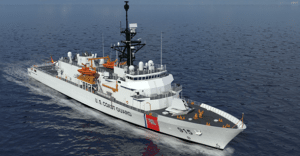
The decision to reopen the competition for the Coast Guard’s new medium-endurance cutter after the current shipbuilder builds up to four of the ships will result in fewer Offshore Patrol Cutters (OPCs) being acquired in the initial years of the program than planned, Coast Guard Commandant Adm. Karl Schultz indicated on Tuesday. Under the new plan, the Coast Guard intends for Eastern Shipbuilding Group (ESG) to build up to four OPCs rather than the minimum of nine contracted for a…

 By
By 











